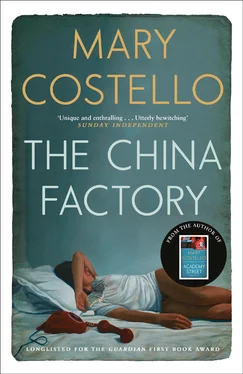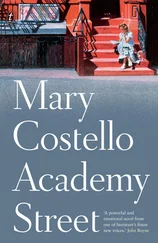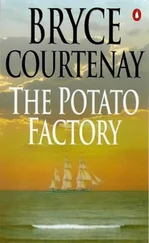Suddenly I was startled by a pigeon brushing my arm and landing at my feet. It fluttered and hopped on one leg and then I saw the damaged foot. There remained only one misshapen toe and its nail, ingrown, coiled tightly around the leg, swollen, sore, unusable. I met the pigeon’s round, black empty eye and thought of the word derelict and it seemed like the saddest word I had ever encountered. Two more pigeons landed close by and pecked at crumbs. And then a gust of wind — tight against the street — blew in and tossed napkins and paper cups and wrappers from the tables. My chocolate, half-eaten in its gold-foil wrapper, blew to the ground. My pigeon hopped over and pecked at it and I smiled at his good fortune and then, in panic, thought that Don would now smell the cigarette when I got home. I checked my watch and remembered Robin and her tiny clenched fists and her moist eyelids, and wondered why I had ever left her. I went to rise and a terrible racket of flapping wings and screeching started up at my feet. The others had come after the chocolate. They had cornered my lame pigeon. ‘Shoo, Shoo,’ I called at them. I waved my arms and tried to rise again but with my shaking hands and my clamorous heart and the terrible screeching of pigeons, I fell back into the chair.
Later I fled the city, trembling, and drove fast towards the suburbs, with Robin on my mind and a sinking feeling that I might not see her again.
At the front door I reached into my pocket but found no key. I looked in the living-room window. Robin was asleep in her Moses basket. She was there, safe, and she was mine.
I walked around to the back of the house. The old fir trees were pressed flat against the sky and everything was still. The neighbourhood was silent and the birds and the dogs and the children’s street play were all absent, or that is how I remember it, as if all living creatures had sensed danger and fled, as they do on high Himalayan or Alpine ground before an avalanche. The back door is half glass and Don had his back to me. I raised my hand to knock on the glass and then I saw Lucy, in front of him, wedged up against the counter. He stood over her, leaning into her, with an arm on each side of her and his palms flat on the counter. He was spread-eagled; he had her cornered. Her body and face were hidden from me; her hands moved on his shoulders, and then her fingers touched his neck, and her legs in jeans emerged from between his. I looked at the back of his head, at his thick black hair, his square shoulders. He was wearing a check shirt I had given him at Christmas, and his dark brown corduroy trousers. He moved his hips and his thighs, grinding her, and I thought: she is too small for him, he will crush her. But I underestimate Lucy.
And then he stopped moving and tilted his head, as if hearing something. He turned his face to the right and I slid back. All he would have caught was a shadow, like a bird’s, crossing the back door. I walked lightly around to the front and sat in the car. Later I rang the doorbell and pretended to search for something in the boot. And things started to come out and move again. A jeep drove into the cul-de-sac and a child yelped and cycled his tricycle along the footpath. An alarm went off at the other end of the street. Finally Don opened the door.
‘I forgot my keys,’ I explained quickly. He looked at me, that too calm look.
‘You should have come around the back. Robin might have woken with the bell.’
‘Did she sleep the whole time?’ I asked, and we looked at each other for a terrible moment and neither one of us heard his reply.
*
Now I hear his movements below and I become anxious. He is locking the back door. I have a sense of being in both places now — there, below with him, and here in the bed. My heart is thumping and I am far from sleep.
And then suddenly I am exhausted from the effort of tracking him. My bed is too warm, too familiar, like a sickbed. I am agitated, and I twist and turn and lie horizontally and try to use up all the space and I remember a childhood illness, a fever, and my mother’s voice in the darkened room, saving me. And now I want Don here, I want the memory of him here. I want him beside me so that I can find the slope of his body and lie against it. I want him to reach across the wide bed and draw me into his arms. I want him to lay his large hand flat on my belly and press gently and feel desire flood through me. I want to be silent and dreamy and view this room, this sky, everything, from a different angle. I want to be shielded by trees and lie against him and sleep.
‘You asleep?’
I did not hear him come upstairs. He has stolen upon me before I am prepared. He approaches my side of the bed but stands back a little. His voice is soft and defeated. I open my eyes and look at him. I am waiting for some sound to rise out from inside me, a few words to send across this short distance that will not disappoint. He waits too and a long look passes between us and I know something has spoilt, and then he moves away and starts to undress. And for the first time his undressing, piece by piece, is too intimate and crushing and revealing and I close my eyes and weep.
He goes into the bathroom and closes the door. In a moment I hear the flush and the brushing of teeth. When he returns he walks around the room and hangs up his clothes, unplugs the hairdryer, tidies away his shoes. Now and then he clears his throat in a precise, emphatic way. He does this when we argue — he appears occupied in his task, untouched, untroubled, aloof. He does it to distance me, to reduce me, to make me think, This is nothing . And I am left wondering — do I magnify everything, do I magnify the words and the pain and the silences? Do I?
He reaches for a pillow and for a moment I think he is going to take it to the front room. But he gets in beside me. He sits with his arms folded, looking from him, and I can feel the rise and fall of his chest. I wonder at his thoughts, at those clear thoughts I imbue him with, at his certainty, at how he seeks always to unscramble things when all I can summon is silence, and how I will never know him but always imagine him. Outside there is the occasional flapping of our clothes on the clothesline, and then the faint distant whistle of the wind, as if it has moved off and left our house alone tonight. And I think this is how things are, and this is how they will remain, and with every new night and every new wind I know that I am cornered too, and I will remain, because I cannot unlove him.
The house is quiet. He knows from the light in the room that it has rained. He rolls onto his stomach. In the flat above someone crosses the floor, uses the bathroom and returns, and the house falls silent again. A car drives by, and the rubbery sound of the tyres lingers on the wet street. He switches on the radio and listens to the forecast. He thinks of how clouds darken the mountain at home, and rain beats down on the faces of anyone walking on the shore. He falls back to sleep again. He dreams of a bear in his mother’s garden, rooting for something, and then sloping off, large and lonesome in the distance.
Later he goes out to buy bread. The sun on the wet street dazzles him. Outside the big stone church he peels off his sweatshirt. Two girls climb out of a basement and walk ahead of him, pulling suitcases behind them. He wishes he had gone west for the weekend. Saturday night in Dublin leaves an ache in him. The parish football team is playing a semifinal on Sunday. The pub will be lively with locals and tourists and a few older emigrants home on holidays. He turns onto the main road and buys bread and a newspaper in the corner shop. A bus draws up outside. Sometimes in winter he goes to town, sits in a café and reads his paper, then browses the bookshops. He goes straight to the gardening sections and thumbs through the design books and memorises the plans. He has grown to like the city a little in winter; there is more honesty, less artifice, people wear raincoats and strong shoes and keep their heads down.
Читать дальше












